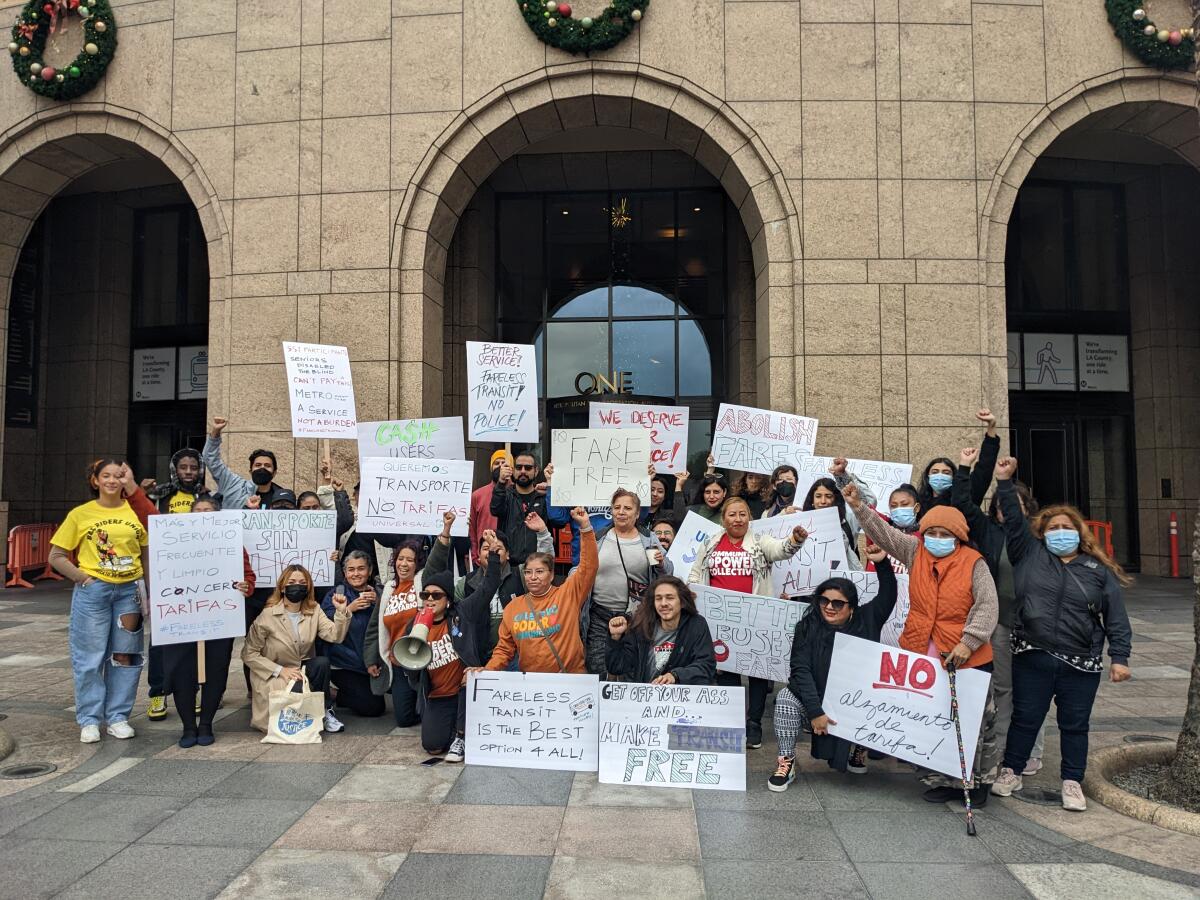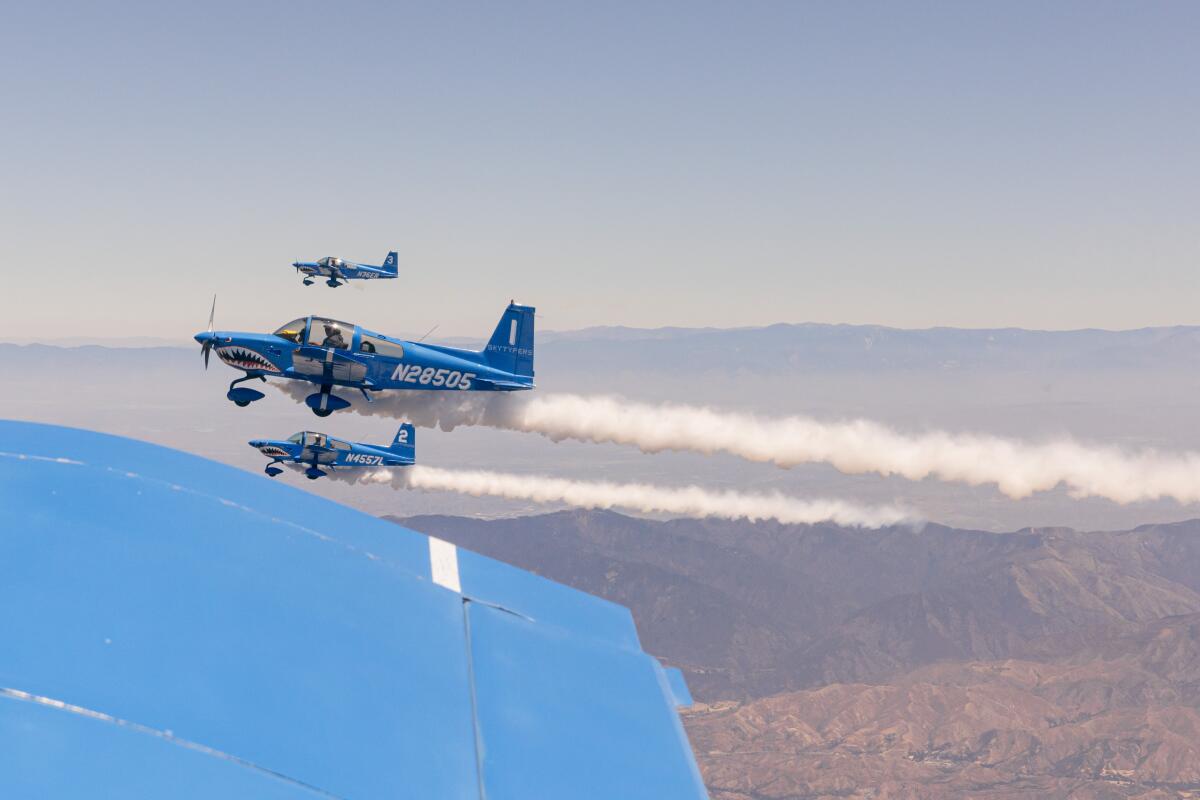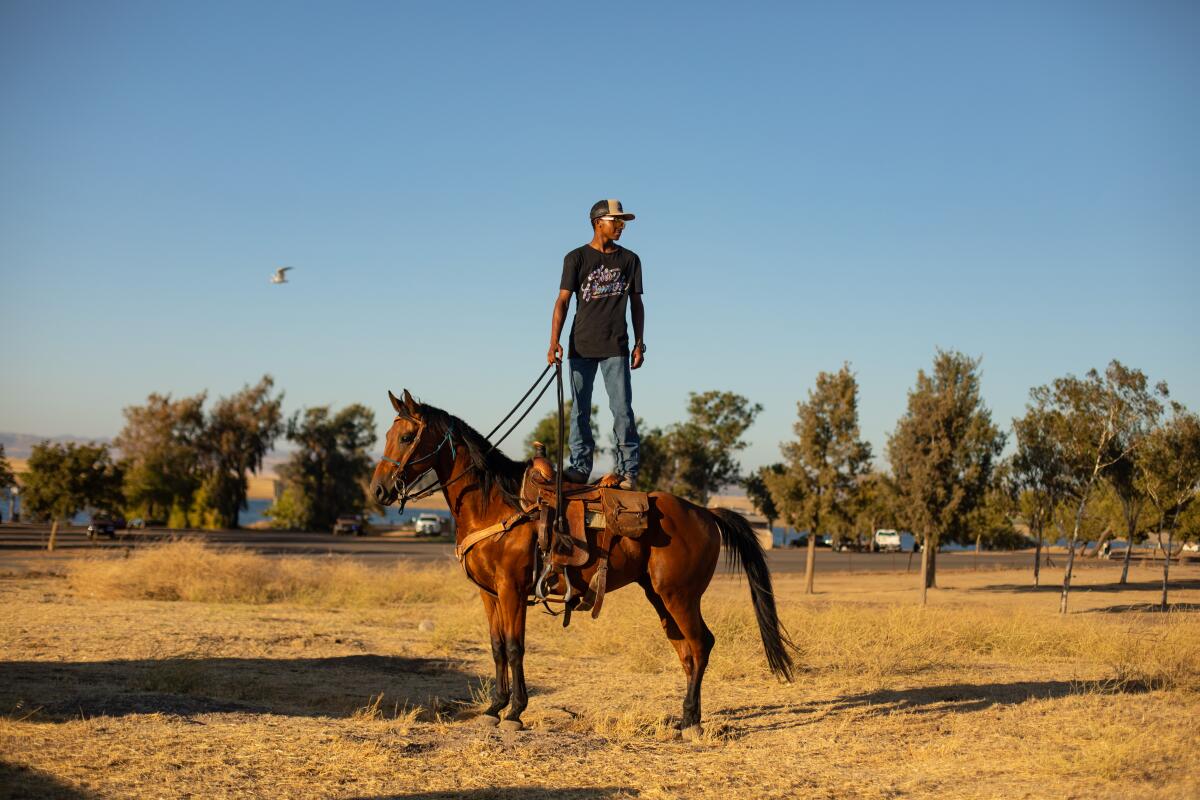We asked if public transit should be free. Hundreds of you answered

- Share via
Good morning, and welcome to the Essential California newsletter. It’s Monday, Dec. 5. I’m Ryan Fonseca.
Last week, as the leaders of California’s largest public transit agency considered some changes that would increase fares for some riders, I posed a question to you in the newsletter: Should we just make public transit free?
Ultimately, the Los Angeles County Metropolitan Transportation Authority’s board of directors approved a new fare-capping plan, meaning riders would pay for trips on the system until they hit a fixed dollar amount (structured daily and weekly), then ride free after that. They also decided not to cut the discounted off-peak fare price for seniors and riders with disabilities — and they opted against a plan tying future fare hikes to inflation rates.
“What that proposal means is, because you are paying more for bread and because you are paying more for milk, you have to pay more for transit,” board member and L.A. City Councilmember Mike Bonin said during Thursday’s meeting. “That doesn’t make sense.”
Ahead of that meeting, transit riders and advocates rallied in front of L.A. Metro’s downtown headquarters, calling on the agency to stop collecting fares and make the system free and accessible to everyone.
That same sentiment was echoed in many of your comments in our callout. As of Sunday afternoon, we have more than 1,700 submissions.
Overwhelmingly, your responses expressed support for making public transit free for all. Some of you noted that we already pay into the service with our tax dollars. Many said it would encourage people to choose transit over their cars, reducing traffic congestion and contributing to the state’s and nation’s goals of reducing harmful carbon emissions.
Of the relatively few comments in opposition to free transit, a common concern was that it would lead to more unhoused Californians on buses and trains. Others worried service could begin to deteriorate, making it less useful for the people who rely on it the most.
I mentioned in my inaugural newsletter that I wanted to include more of your voices, and you definitely showed up! Thank you to everyone who took some time out of their day to share their thoughts (look out for more callouts in upcoming editions).
Here’s a small sampling of what hundreds of you had to say (some responses were lightly edited for clarity and brevity):
“[Free transit] is practical, and it is necessary, given how California’s air quality is terrible and roads constantly jammed. Making transit free would draw some additional people out of their cars and make the state more livable.”
— Sean Wherley, Los Angeles
“I am a person who is currently on Social Security, and on the low end of that. Even though I am getting senior discounts, the money I spend on public transportation could also be spent on rent that may be going up next year — and the cost of food, which already is going up. Public transportation with no out-of-pocket cost would be a godsend.”
— Don Paschal, Los Angeles
“Public transport is a utility that should be fully subsidized by the state. Anything short of that is violence against the poor.”
— Nilesh Patel, San Diego
“As a college student, I should not have to choose between my budget and my need to get between class, work, and home. Transit is a public resource — its purpose is to provide a public good, not to turn a profit.”
— Lilly Armstrong, Berkeley
“No, making it free would result in a more unsafe and dirtier environment and drive away middle-class riders like me. Better option would be to subsidize passes for low-income riders.”
— Joanne Kang, Los Angeles
“California has a strong tax base that could fund fareless transportation for all riders. This would likely increase transit use and decrease private cars on roads, highways and freeways. It would be an investment in our state’s future.”
— Bryan Mack, Bishop
“After transit started charging again this year, I remember seeing numerous people try to get on the bus and be turned away because they couldn’t afford it. Paying fares slows down transit service. Movement is a human right, and we should make sure that everyone has access to it — and the more people who use transit, the more frequent service can be.”
— Alyssa Ross, Santa Monica
“I don’t currently use public transportation, but we will all have to consider it to address the climate change issue. If free public transportation could eliminate the need for a car, the cost savings for a household may offset the public cost of providing free service.”
— Tim Moran, Modesto
“Making public transit free would increase the accessibility of these services for people who need it the most. Folks living paycheck to paycheck would have one less cost to worry about in their lives. Simultaneously, this would help reduce the amount of pollution stemming from cars in a region overburdened by automobiles.”
— Dante Valenzuela, Compton
“Everyone using public transit is much more of a friend to the planet and our lungs. It makes no sense to charge people for doing a public good.”
— Stanley Nelson, Los Angeles
“Public transit agencies around the state cannot afford to make public transit free without substantial increases in federal, state, and local subsidies. That’s not going to happen because of competing good programs that taxpayers pay for as well. Also, citing budget numbers can be misleading because only a small portion of the subsidies transit agencies get can actually be used for operations. Cutting fares is a direct cut to operations funding with very few resources to make up for it. You will get shiny new electric buses with nobody to drive them.”
— Shane Gusman, Sacramento
“Transportation racism and classism have long plagued our state. With housing costs what they are, some of the poorest workers have to travel the farthest distances and pay the most for transit. Public transportation should be a true commons, free to all and a site of movement and community, not fare policing. Finally, with the climate catastrophe upon us, it makes absolute sense to incentivize even those in the middle class (like me) who have cars to begin to abandon them in favor of public transportation. It’s simply shortsighted not to make public transportation free and accessible to all immediately.”
— Molly Talcott, Los Angeles
“This is the type of public good a government should provide for. Fares being free provides an incentive for everyone to use public transit, which has important implications for sustainability and traffic (fewer cars on the road). The government gives massive tax breaks and benefits to the rich and corporations. The benefit of free public transit to everybody — but especially those who are economically marginalized — is clear!”
— Ellie Corbas, San Francisco
“Our dependence on cars to get everywhere causes congestion, oversized roads, and countless traffic fatalities that cost tenfold more than increasing public transit and making it free as well.”
— Tim Gentry, San Simeon
“We need a paradigm shift in transportation for the sake of the climate, for walkable, pleasant communities, for safer streets. Making public transit free is an investment in a more just and climate resilient society. It would allow transit law enforcement to focus solely on public safety rather than fare collection, and the money lost from fares could be recouped by ending subsidies to cars like free parking and widening highways.”
— Isaiah Berke, Los Angeles
And now, here’s what’s happening across California:
Note: Some of the sites we link to may limit the number of stories you can access without subscribing.
L.A. STORIES

Skywriting was all the rage in the early days of aeronautics. Now it’s making a comeback in the skies over Los Angeles, Times reporter Ronald D. White explains, fueled by “social media and our insatiable promotional hunger.” Definitely wouldn’t want to be the pilot who flew a typo. Los Angeles Times
Check out "The Times" podcast for essential news and more
These days, waking up to current events can be, well, daunting. If you’re seeking a more balanced news diet, “The Times” podcast is for you. Gustavo Arellano, along with a diverse set of reporters from the award-winning L.A. Times newsroom, delivers the most interesting stories from the Los Angeles Times every Monday, Wednesday and Friday. Listen and subscribe wherever you get your podcasts.
POLITICS AND GOVERNMENT
Transit agencies in the Bay Area say service cuts could be coming as ridership remains low and federal pandemic aid money dries up. Operators are preparing for worst-case scenarios as they approach that fiscal cliff. San Francisco Chronicle
CRIME, COURTS AND POLICING
Robert Luna, former Long Beach police chief, was sworn in this weekend as Los Angeles County’s 34th sheriff. He’ll have his hands full as the top cop for the most populous county in the nation, including mending relationships with county leaders that were strained by his predecessor, Alex Villanueva. Luna says he aims to “defend good policing,” adding that his department also has a “responsibility to call out bad policing.” Los Angeles Times
In case you missed it last week, San Francisco city leaders approved a new policy that would allow police there to kill people with robots. Law enforcement officials had argued robots might be needed in extreme scenarios against violent perpetrators such as a mass shooter or suicide bomber. But civil liberties groups have been speaking out against the policy, which they say further militarizes policing and could harm communities of color. Wired
Support our journalism
HEALTH AND THE ENVIRONMENT
California drivers still rolling with that old-school fuel should expect to cough up even more money to gas up. With a state mandate to end sales of new gas-burning cars and trucks by 2035, the oil industry, which of course likes to make money, will likely charge drivers who haven’t gone electric more at the pump to maximize their profits in a shrinking state market. (In related news, California lawmakers will open a special legislative session today to consider placing financial penalties on oil companies for excessive profit.) Los Angeles Times
CALIFORNIA CULTURE

Howdy! Black Californians have a long, rich history as part of Old West culture, though that might not be the first image that comes to mind when we picture someone on horseback. But recent films like “Nope” and the “The Harder They Fall” are putting a spotlight on Black cowboys and cowgirls. As one rider told Times writer Tyrone Beason: “We are the original cowboys, and the world is waking up to that.” Los Angeles Times
Free online games
Get our free daily crossword puzzle, sudoku, word search and arcade games in our new game center at latimes.com/games.
CALIFORNIA ALMANAC
Los Angeles: partly sunny, 63. San Diego: partly sunny, 63. San Francisco: showers, 58. San Jose: rain likely, 58. Fresno: slight chance of rain and fog, 59. Sacramento: showers, 56.
AND FINALLY
Today’s California memory is from John R. McNicholas Jr.:
My folks were raising four kids in Glendale’s Glenoaks Canyon, back when the road ended in stables and an unsupervised rifle range. Just before the Red Cars were junked in 1955 (I was 6) my mother took us to ride the trolley into downtown L.A. and back. At the L.A. end of the line, we stood and watched the conductor go through the car and turn all the seats around to face the opposite direction. He drove the return trip from what had been the back of the car. I was stunned and amazed.
If you have a memory or story about the Golden State, share it with us. (Please keep your story to 100 words.)
Please let us know what we can do to make this newsletter more useful to you. Send comments to essentialcalifornia@latimes.com.
Sign up for Essential California
The most important California stories and recommendations in your inbox every morning.
You may occasionally receive promotional content from the Los Angeles Times.




